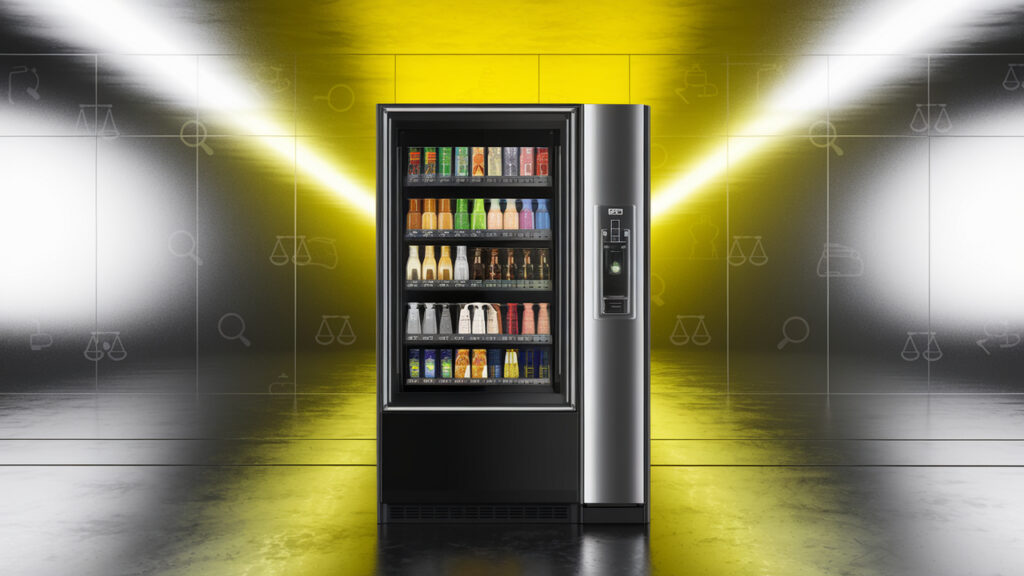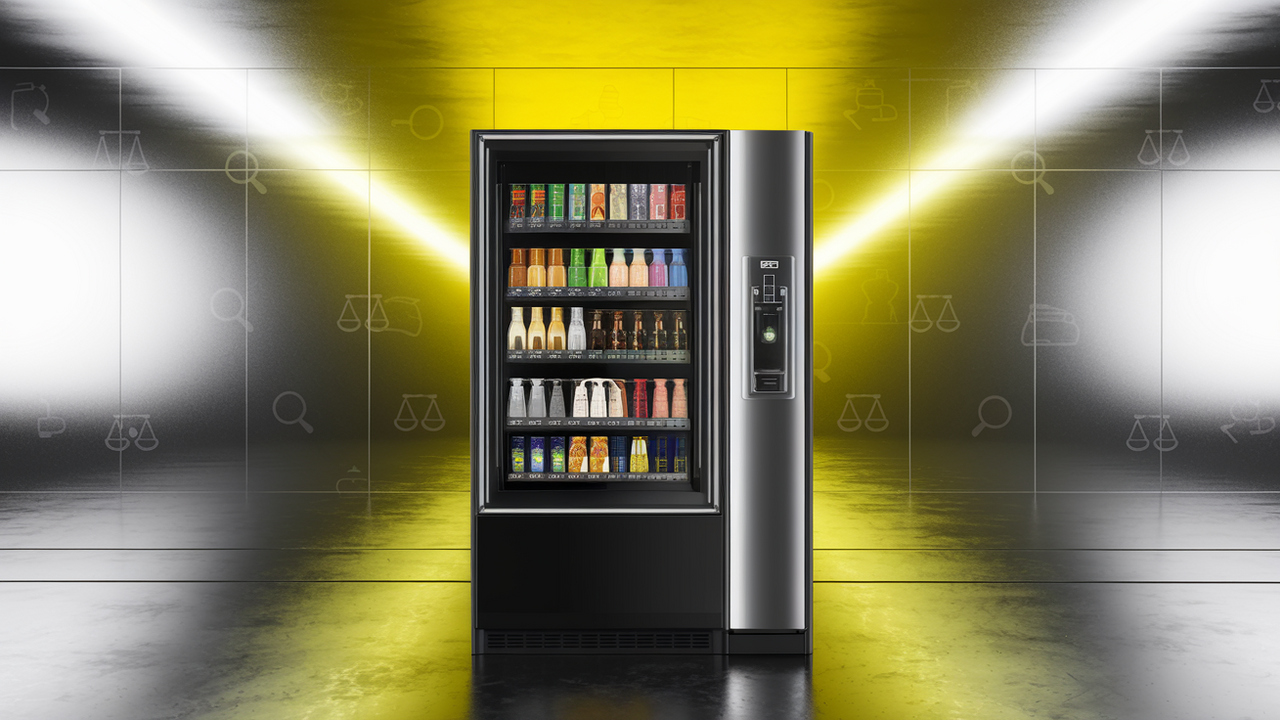How to Find and Compare Vending Machine Distributors
When I first got into the vending business, one of the biggest decisions I had to make was where to buy my machines. It’s tempting to jump on the first deal you find online, but trust me—choosing the wrong distributor can cost you time, money, and endless frustration. Whether you’re buying your first vending machine or scaling your route, knowing how to find and compare vending machine distributors is essential.
In this guide, I’ll walk you through the steps I use to research and evaluate distributors, the questions I ask before buying, and the red flags that help me avoid scams or unreliable vendors.

Table of Contents
Step 1: Decide What Type of Machine You Need
Before even looking for a distributor, figure out what kind of machine fits your target location:
- Snack and drink combo machines for offices, gyms, and apartments
- Drink-only machines for break rooms, schools, and vending banks
- Specialty machines for tech products, coffee pods, or beauty items
- Healthy vending machines for wellness centers or schools
- Refurbished machines for low-budget startup locations
Your choice will narrow down which distributors actually carry what you need—and whether you need financing, shipping, or bulk discounts.
Step 2: Start With a Broad Search
Here’s where I usually begin:
- Google Search: Use terms like “vending machine distributors near me” or “combo vending machine supplier USA.”
- Facebook Groups: Search for vending owner communities. I’ve found legit referrals just by asking other vendors where they buy.
- eBay and Amazon: These platforms often list vending machines sold by authorized resellers—but always double-check the actual company behind the listing.
- UsedVending.com and Vending.com: Well-known platforms for both new and used machines with transparent pricing and specs.
Create a shortlist of 5–7 distributors you want to research further.
Step 3: Check for Licensing, Support, and Reviews
Here’s what I look for when reviewing a vending distributor:
- How long have they been in business? I prefer companies with at least 5 years of sales history.
- Do they offer support or training? Some distributors help you with setup, manuals, and ongoing tech support.
- What’s their warranty policy? A 90-day or longer warranty is a good sign they stand behind their machines.
- Do they have phone support? Email-only vendors tend to disappear when you need help.
- Google and BBB reviews: Look for feedback from real customers, especially about machine quality and responsiveness.
If a company has dozens of complaints about damaged shipments or zero customer service, I stay far away.
Step 4: Compare Machines, Features, and Pricing
Don’t just go for the cheapest machine—compare by value. I’ve learned that paying a little more upfront often means fewer problems later.
Here’s what I compare side-by-side:
- Machine type and capacity (how many selections, drinks, snacks)
- Whether it supports card readers and cashless payments
- Energy efficiency rating
- User interface (simple buttons vs touchscreen)
- Warranty coverage
- Price (including shipping, setup, and installation)
I keep a spreadsheet that breaks this all down per vendor. It helps me quickly spot which distributor offers the best machine for the money.
Step 5: Ask These Questions Before You Buy
When I contact a distributor, I ask these specific questions:
- Do you offer financing or payment plans?
- What’s the return policy if the machine arrives damaged?
- Can I speak to a tech support person before buying?
- Do you include a setup guide or software instructions?
- What’s included in the delivery—curbside or indoor placement?
How they answer tells me everything I need to know about their customer service quality.
Step 6: Test Their Customer Service
Before I spend thousands on a machine, I always test their support by calling or emailing a basic question. If I don’t get a clear and helpful response within 24–48 hours, that’s a red flag. In this business, speed matters—especially when machines go down.
A distributor that responds fast, gives straight answers, and doesn’t dodge your questions is worth working with long-term.
Step 7: Consider Buying Local (If Possible)
If you’re just starting out, buying from a local distributor can save you money and hassle. You avoid long-distance shipping issues, and you may be able to see machines in person before buying. Some vendors even offer local repair services or discounts for pickups.
Search “[your city] vending machine distributors” and ask if they allow warehouse visits or showrooms.
Red Flags to Watch Out For
Here are a few warning signs I’ve learned to spot:
- No real business address listed on the site
- Prices that are way below average (often refurbished or outdated models)
- No support phone number or slow email replies
- Generic-looking websites with copy/paste specs
- Asking for payment through wire transfer or Zelle only
- Vague warranty terms or no written policy
If anything feels off—walk away. There are plenty of trustworthy vendors out there.
Final Thoughts
Finding a good vending machine distributor isn’t just about scoring a deal—it’s about getting the right machine from the right people. A reliable distributor becomes a long-term partner, especially when it’s time to grow your route, order parts, or expand into new types of vending.
Take your time. Ask questions. Compare carefully. The right machine in the right location with a solid distributor behind it can generate consistent, passive income for years to come.
One lesson I learned the hard way was that shipping costs can destroy your budget if you’re not careful. Some distributors quote a great machine price—but then tack on $500+ for delivery. Always get an all-in price, including freight and delivery method (especially if you don’t have a loading dock).
When buying multiple machines, ask about volume discounts. I once saved over $800 just by bundling two drink machines with a combo snack unit. Most vendors are willing to offer better pricing when you show serious intent to scale.
If you’re on a tight budget, refurbished vending machines can be a smart option—but only if they come from a reputable distributor. Ask what’s been replaced (bill validator, coin mech, control board?) and whether the machine has been tested for full functionality.
Also pay attention to whether the machine uses universal parts or proprietary components. I prefer machines that use MDB-compatible tech (Multi-Drop Bus) because they’re easier to service, and I can upgrade them later with any standard card reader.
Don’t forget to ask how long the distributor will support your machine after the sale. Some only offer 30 days of support, while others provide phone or email help for the life of the machine. That support can be a lifesaver when you’re installing your first few machines.
I always ask for photos or videos of the exact unit I’m buying, especially when purchasing used or refurbished. This avoids surprises—like dents, missing buttons, or outdated displays—that can cost you in refunds or repairs later.
Sometimes you’ll find a great-looking deal from a seller out of state. In those cases, I ask if they have partner technicians in my region. Some national suppliers have repair networks or relationships with local service pros who can help with installation or warranty work.
Be careful with private sellers on Craigslist or Facebook Marketplace. I’ve bought a few good machines that way—but I’ve also seen sellers disappear after I found issues they didn’t disclose. Always inspect machines in person, test all the functions, and get a receipt.
If the distributor offers pre-loading services, where they stock your machine before shipping, it can save time on setup—but only if you trust their product mix. I personally prefer to stock my own machines based on the location and what I know sells.
You should also verify whether your machine comes with a programming manual or user guide. Some distributors assume you already know how to set pricing, test motors, or reset error codes. If you’re new to vending, this documentation is a must.
Look for distributors that also sell replacement parts and accessories. It’s convenient to source everything—keypads, coin mechs, shelves, decals—from the same place you bought the machine. That way, you’re not scrambling later when a simple part needs replacing.
Lastly, remember that your distributor relationship doesn’t end after the sale. I stay in touch with the reps I trust. They sometimes alert me to upcoming deals, inventory clearances, or new tech machines coming out. That relationship has helped me grow faster and make better buying decisions.

